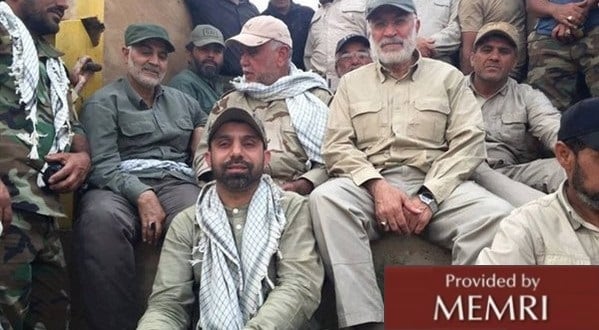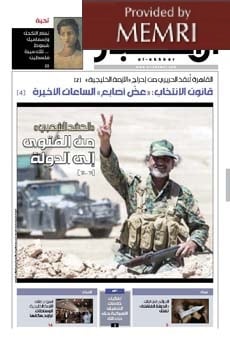Since its establishment some three years ago – following a fatwa issued by Iraqi Shi'ite leader Ayatollah 'Ali Sistani calling for "jihad kifa'i"[1] against ISIS – the Popular Mobilization Units (PMU, Al-Hashd Al-Sha'bi in Arabic), an umbrella organization of armed Iraqi militias, has played an important role in the fight against ISIS in Iraq, alongside the Iraqi army and the international coalition.
Because most of the militias in the PMU are Shi'ite and their commanders are very close to Iran, elements both inside and outside Iraq have long been questioning whether the militias are subordinate to and controlled by the Iraqi authorities, or are in fact controlled exclusively by Iran. To repel this charge by institutionalizing the PMU and thus granting it government legitimacy, in early 2014 the Iraqi government formed the "People's Mobilization Committee." Furthermore, in 2016 the Haider Al-'Abadi government passed the PMU Law, formally incorporating the organization in the country’s armed forces and subordinating it to the prime minister. In an effort to refute the claim that the PMU is controlled by Iran, Iraqi National Security Advisor Falih Fayyad, chairman of the People's Mobilization Committee, said that Iran had extended assistance to the PMU but only in an "advisory" capacity, and emphasized the Iraqi identity of the organization: "In its first months the PMU received assistance from Iran; nevertheless, it is a purely Iraqi endeavor..." Asked about the involvement of senior Iranian commander Qassem Soleimani and of experts from the Lebanese Hizbullah in establishing the PMU, Fayyad said: "We received help from the brothers in Iran and Lebanon... [and] we thank our friends for the extensive advice they granted us."[2]
These statements, however, did not quell the doubts regarding the organization's primary loyalties, for good reason. PMU commanders have openly discussed the militias' close connections with Iran and Hizbullah, as well as their fierce opposition to the U.S. presence in Iraq, which is sanctioned by the Iraqi government. Reports about these connections have also appeared in the Lebanese daily Al-Akhbar, which is close to the resistance axis.
This paper reviews recent statements by PMU commanders, as well as the Al-Akhbar reports, about these connections.

Qassem Soleimani with PMU fighters (image: alarabiya.net, June 1, 2017)
PMU Commanders: Iran, Hizbullah Have Helped Our Jihad Units From The Start; Foreign Presence In Iraq Is A Red Line
As stated, senior commanders in the Shi'ite PMU militias freely admit Iran's and Hizbullah's support for their militias. In an interview with Al-Akhbar, PMU deputy commander Abu Mahdi Al-Muhandis flaunted Iran's involvement in establishing and training the militias: "Iran contributed to the establishment of our jihad forces. It developed them – especially the Badr organization – and [its] Islamic Revolutionary Guards Corps [IRGC] supported us and trained us. After the fall of president Saddam Hussein in April 2003, Iran helped Iraq in everything – materially, financially and politically. In 2014, after the Iraqis heeded the call of supreme religious authority ['Ali Sistani and established the PMU], the IRGC [played] a clear role in training our militias." Al-Muhandis also spoke of his connections with two senior Hizbullah commanders who have since been killed: chief operations officer 'Imad Mughniyya and Mustafa Badr Al-Din: "My personal relationship with them, and with others in the resistance [i.e., Hizbullah], [including] Hizbullah Secretary-General Hassan Nasrallah, goes back a long time. 'Imad [Mughniyya] and Mustafa [Badr Al-Din] trained the first armed jihad groups of the Iraqi opposition in 1982, as well as the first resistance units that opposed the [American] occupation in 2003... Hizbullah's involvement, by means of its advisors, in the fight against ISIS is very important, and some of them were [even] wounded or killed. Nasrallah sent operatives here with the consent and the knowledge of the Iraqi [government]."
Al-Muhandis clarified that the PMU sees Iran and Syria as its allies and opposes the U.S. presence in Iraq. He stated further that Iraq is currently a central part of a "regional plan" in which it cooperates with its neighbors in combatting terror, and added: "The current and former governments decided to open [Iraq's] airspace to Iranian and Russian planes in order to help Syria, despite the ongoing U.S. pressure aimed at preventing Baghdad from opening up an aerial route from Tehran to Damascus."
He stressed that he is committed to the decisions of the Iraqi government but did not hide his opposition to the U.S. presence in the country: "We flatly oppose the foreign military and security presence (the security companies). We don't think they benefit [us]." He called the foreign presence in Iraq, in all its forms, a "red line." Al-Akhbar clarified that "the commitment to the Iraqi government's decision [to allow the U.S. presence] does not oblige Al-Muhandis and the PMU to accept this [fact] and keep quiet about it, but rather motivates them to keep a tight military and security watch [on the Americans] and warn about the increasing number [of U.S. military personnel]." It added: "The possibility of friction or a confrontation between the PMU forces and the American forces is very real. Al-Muhandis does not rule this out 'if Iraq's sovereignty comes under attack.'"[3]
Al-Muhandis made similar statements in a conference held on the margins of the General Assembly of the Islamic Radios and Televisions Union in Tehran: "Were it not for the support extended to the PMU by Iran and Hizbullah, it would never have attained its current achievements against ISIS... We welcome the victories attained in Iraq and thank the Imam, [Iran's Supreme] Leader Ali Khamenei, and Hizbullah Secretary-General Hassan Nasrallah for the help they have given us in the campaign against ISIS." Warning that the U.S. intends to stay in Iraq and increase its presence there, he said: "We will thwart with all our might the American plan to take control of the Syria-Iraq border and establish a zone under American influence there... They accuse us of opening up a route between Damascus and Baghdad. We will [in fact] guard this route and maintain our ties with the Syrians and Lebanese... In the future Iraq will have an important regional role in supporting Syria."[4]
Kazem Al-Jabri, commander of Saraya 'Ashura, a major component of the PMU, likewise thanked Iran for the help it has extended to Iraq in the fight against ISIS. He said in an interview with Hizbullah's Al-Ahed website: "Without Iran, Iraq never would have won... Iran gave Iraq a lot of help and support in its campaign against ISIS, especially in the form of security and military advice, as well as the necessary logistic [assistance] and supportive political positions...[5]"
SUPPORT OUR WORK


Qassem Soleimani with Badr commander Hadi Al-Amiri and Abu Mahdi Al-Muhandis (image: alarabiya.net, June 5, 2017)
Reports In Pro-Hizbullah Lebanese Daily Al-Akhbar: PMU Has Close Ties To Iran, Hizbullah
Further evidence of the PMU's close connections to Iran and Hizbullah is found in reports published in the recent year in the pro-Hizbullah Lebanese daily Al-Akhbar. The head of the daily's board of directors, Ibrahim Al-Amin, wrote that Iran's opponents had failed in their attempts to hobble this country and the resistance forces in the region, and that, in Iraq, even the ouster of prime minister Nouri Al-Maliki for his loyalty to Iran did not significantly change the situation on the ground. According to him, Hizbullah "sent experts and operatives to Iraq, [and] Iran supplied everything that was needed to establish the PMU and to support its activity."[6]
In another article, addressing Israel's threats to Hizbullah, Al-Amin stressed that the organization had become a significant force in the region at large. As for its role in Iraq, Al-Amin wrote: "Hizbullah's military and security experts are present in the most important war rooms. Hassan Nasrallah has become the inspiring commander of the PMU and the authority directing most of the political relations [in Iraq]..."[7]
The PMU's close ties to Hizbullah and Iran were also mentioned in several articles published by Al-Akhbar on July 13, 2017 to mark the third anniversary of the PMU's establishment as well as the defeat of ISIS in Iraq. The articles were full of praise for the PMU's role in the war against ISIS, and one of them even claimed that it was these militias that had "saved Iraq and the Iraqi people" from ISIS.
Another article stated: "These factions [the Shi'ite militias in Iraq] were eroding, but the leader ['Ali Sistani], of Iranian origin, fulfilled a crucial role in reviving them after Iran took a strategic decision to put its weight behind Iraq – both the state and its people – in order to enable it to fight ISIS on its own..." The article added that the PMU's strength lies mainly in "the ideological commitment of its fighting units" and in its good planning and staff work. It stated further "the Iranian and Lebanese foreign experts that the PMU imported [to Iraq] with the knowledge and consent of the Iraqi government played an important role in establishing and activating [the PMU] and in its planning and training [activities]." The article stressed that "the spirit of courage and daring with which the [PMU] operatives are blessed stems mostly from the general spirit of revival that filled the Iraqi street following the fatwa issued by the supreme religious authority ['Ali Sistani], and also from the cultural traits inherent to the social sectors that had heeded this fatwa [and joined the PMU]."[8]

Front page of Al-Akhbar's June 13, 2017 issue celebrating the PMU's third anniversary, with headline: "The PMU – From Fatwa to State"
Yet another article stated: "From the Baghdad area, through the center [of Iraq] and up to the north and to the deserts of Al-Anbar, the PMU scored an unbroken chain of victories through local effort and immense battles, with the assistance of Iranian experts and Lebanese ones [from Hizbullah]."[9]
[1] Collective jihad, namely a duty incumbent upon the Muslim community as a whole rather than on each individual Muslim. The duty is fulfilled as long as a sufficient number of Muslims engage in it.
[2] Al-Akhbar (Lebanon), February 9, 2017.
[3] Al-Akhbar (Lebanon), May 23, 2017.
[4] ISNA (Iran), July 4, 2017.
[5] Alahednews.com.lb, March 19, 2017.
[6] Al-Akhbar (Lebanon), January 24, 2017.
[7] Al-Akhbar (Lebanon), July 3, 2017.
[8] Al-Akhbar (Lebanon), June 13, 2017.
[9] Al-Akhbar (Lebanon), June 13, 2017.




